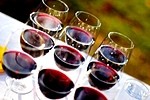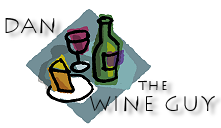Whether Judging or Casual Tasting, Don’t Be Afraid to Share Your Opinions
- Posted by Dan Radil
- Posted on July 22, 2014
- Past Articles
- No Comments.
I had the privilege of serving as one of 28 judges in the 19th Annual Northwest Wine Summit earlier this year. The first half of the event was held in Naramata, British Columbia and I participated in the second half in Hood River, Oregon.
Sometimes it seems as if nearly every wine entered in a competition wins a medal. That was hardly the case at this year’s Summit, where only 89 of the 942 wines entered received a gold medal. In addition, 254 wines earned a silver medal and 258 a bronze.
 Brian Carter Cellars’ 2009 Solesce, a proprietary Meritage-style blend was selected Best of Competition and Best Red Wine, while Kiona Vineyards and Winery 2013 Chenin Blanc was named Best White Wine.
Brian Carter Cellars’ 2009 Solesce, a proprietary Meritage-style blend was selected Best of Competition and Best Red Wine, while Kiona Vineyards and Winery 2013 Chenin Blanc was named Best White Wine.
Two British Columbia wineries, Gheringer Brothers Estate Winery and La Frenz Winery, along with Washington’s Maryhill Winery garnered Wineries of Distinction honors based on the number of gold medals received. La Frenz took home eight golds, Maryhill earned five, and Gheringer received four.
Another Washington winery, Thurston Wolfe, earned both the Best of Washington award and Best Fortified Wine for its Non-Vintage Tawny Port.
If you think judging wines is a “fun” and glamorous task, think again. There’s an element of fatigue to deal with, and after tasting dozens of wines in a day, the last thing you want to look at is another five-glass flight of merlot.
 In addition, the process of swirling, tasting, spitting and evaluating is serious business. Comments are exchanged, a final score is arrived at, and, thanks to a great group of fellow judges, nothing close to fisticuffs broke out at any time.
In addition, the process of swirling, tasting, spitting and evaluating is serious business. Comments are exchanged, a final score is arrived at, and, thanks to a great group of fellow judges, nothing close to fisticuffs broke out at any time.
Judges consisted primarily of winemakers, distributors, and writers and critics, like me. I considered myself to be a representative for the average wine consumer. This sometimes left me feeling a little intimidated, especially if two winemakers were at the table pontificating in technical jargon.
I mentioned this to a winemaker after the competition and much to my surprise, he said that he felt intimidated by me. His reasoning was that his laser-sharp focus is primarily on the wines he produces, while I have a broader range of wine tasting experiences to draw upon.
Volume of wines aside, his comments called to mind some of my own wine tasting philosophies that I lost track of during the competition. First, there are no right or wrong “answers” when tasting wine, only consensus; and second, never be afraid to share with others what you taste.
That’s sound advice for so-called experts, casual wine drinkers and novices alike and it’s something to keep in mind whether you’re involved in a serious tasting or simply enjoying wines in an informal setting at home.
Categories
- Events
- Food & Wine
- FrontPage
- Heard Through the Grapevine
- New Northwest Wine Recommendations
- Past Articles
- Recommendations from the Archive
Things to Check Out
Wine Dinner & Class Locations
Archives
- March 2025
- February 2025
- December 2024
- October 2024
- September 2024
- June 2024
- April 2024
- March 2024
- January 2024
- December 2023
- September 2023
- August 2023
- July 2023
- June 2023
- March 2023
- January 2023
- December 2022
- September 2022
- June 2022
- March 2022
- January 2022
- December 2021
- November 2021
- October 2021
- September 2021
- August 2021
- July 2021
- June 2021
- May 2021
- March 2021
- February 2021
- January 2021
- December 2020
- November 2020
- October 2020
- September 2020
- August 2020
- June 2020
- April 2020
- March 2020
- February 2020
- January 2020
- December 2019
- October 2019
- September 2019
- August 2019
- July 2019
- June 2019
- March 2019
- February 2019
- January 2019
- December 2018
- November 2018
- October 2018
- September 2018
- July 2018
- June 2018
- May 2018
- April 2018
- March 2018
- February 2018
- January 2018
- December 2017
- November 2017
- October 2017
- September 2017
- August 2017
- July 2017
- June 2017
- May 2017
- April 2017
- March 2017
- February 2017
- January 2017
- December 2016
- October 2016
- September 2016
- August 2016
- July 2016
- June 2016
- May 2016
- April 2016
- March 2016
- February 2016
- January 2016
- December 2015
- November 2015
- October 2015
- September 2015
- August 2015
- June 2015
- May 2015
- April 2015
- March 2015
- February 2015
- January 2015
- December 2014
- November 2014
- October 2014
- September 2014
- August 2014
- July 2014
- June 2014
- May 2014
- April 2014
- March 2014
- February 2014
- January 2014
- December 2013
- November 2013
- October 2013
- September 2013
- August 2013
- July 2013
- June 2013
- May 2013
- April 2013
- March 2013
- February 2013
- January 2013
- December 2012
- November 2012
- October 2012
- September 2012
- August 2012
- July 2012
- June 2012
- May 2012
- April 2012
- March 2012
- February 2012
- January 2012
- December 2011
- December 2009
- May 2009
- April 2009
- March 2009
- February 2009
- January 2009
- December 2008
- November 2008
- October 2008
- September 2008
- August 2008
- July 2008
- June 2008
- May 2008
- April 2008
- March 2008
- February 2008
- January 2008
- December 2007
- November 2007
- October 2007
- September 2007
- August 2007
- July 2007
- June 2007
- May 2007
- April 2007
- March 2007
- February 2007
- January 2007
- December 2006
- November 2006
- October 2006
- September 2006
- August 2006
- July 2006
- June 2006
- May 2006
- April 2006
- March 2006
- February 2006
- January 2006
- December 2005
- November 2005
- October 2005
- September 2005
- August 2005
